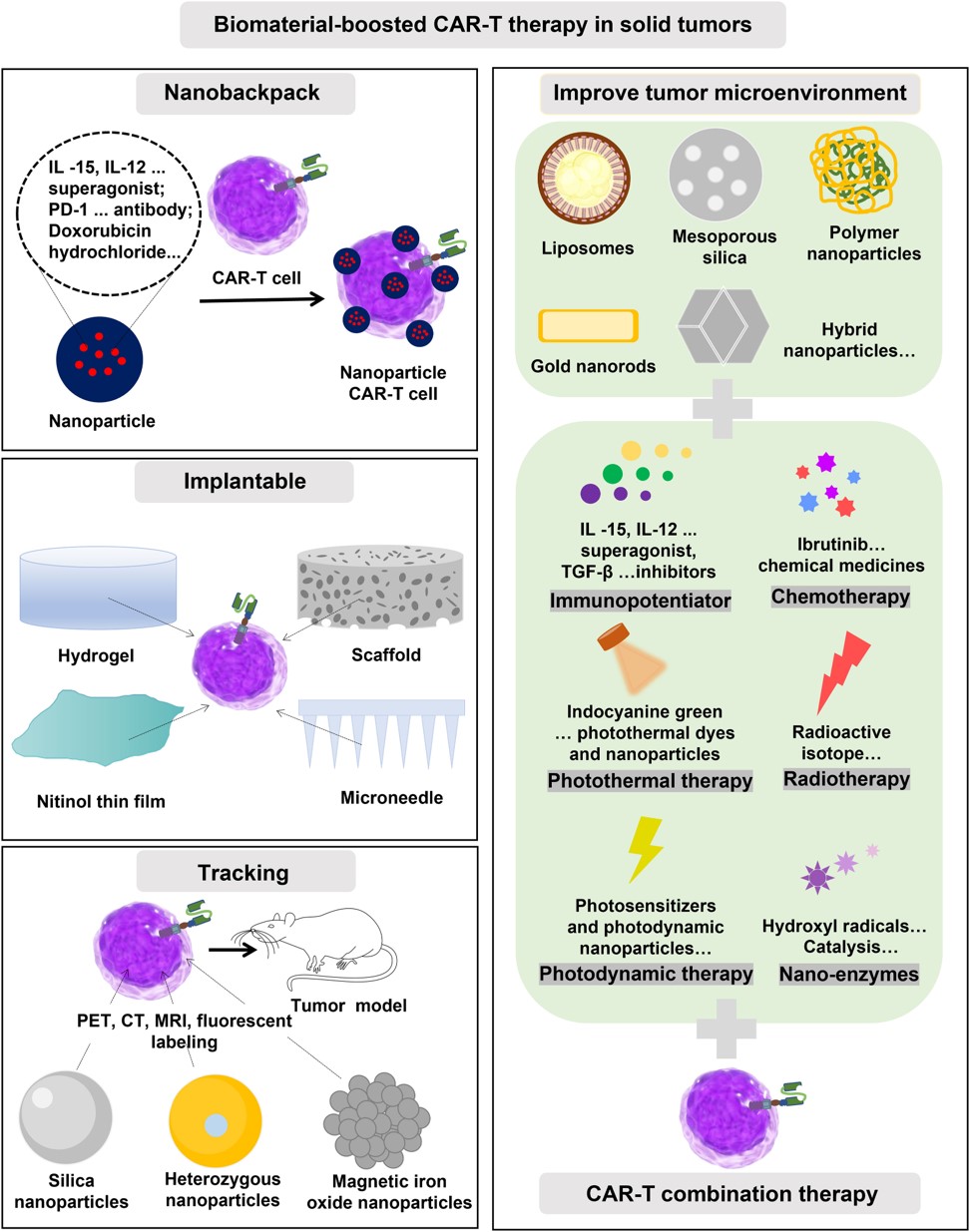T cells are central players in both immune system function and the success of immunotherapies. Manipulating T cell populations, particularly expanding specific T cell subtypes, is a key strategy for enhancing immunotherapy effectiveness. Natural T cell activation is a tightly regulated process, relying on intricate interactions between T cells and antigen-presenting cells to initiate an immune response. To enhance cell therapies and directly activate T cells for off-the-shelf treatments, scientists have been working on artificial platforms that can mimic this natural stimulation process. Amongst, the advancements in DNA nanotechnology and biomaterials are expanding the toolkit for precise and targeted immune activation, offering new possibilities for cancer immunotherapy and other cell-based therapies.
 Fig.1 Biomaterials boost CAR-T efficacy in solid tumors.1
Fig.1 Biomaterials boost CAR-T efficacy in solid tumors.1
DNA-based Artificial T Cell-Stimulating Platform Development Service at Creative Biolabs
Creative Biolabs integrates advanced DAN nanotechnology and biomaterials to establish a DNA-based artificial T cell stimulating platform development service. This innovative platform utilizes DNA-based scaffolds to create long dendritic cell-like processes, maximizing the surface area-to-volume ratio for optimal T cell stimulation. The platform can be customized with various protein conjugation chemistries to precisely control the conjugation of multiple distinct proteins at controlled ratios. This allows for fine-tuning of T cell activation signals and improved antibody conjugation. With our extensive expertise and experience, Creative Biolabs guarantees the development of a highly effective and customizable T cell stimulating platform tailored to your specific research needs.
Moreover, Creative Biolabs provides comprehensive functional characterization services, which span the entire development process, from in vitro characterization of the artificial T cell stimulator/stimulating platform toin vivo evaluation of its efficacy. Utilizing cutting-edge technologies, we ensure high-quality results while closely monitoring every step. At Creative Biolabs, we are committed to delivering satisfactory results within the customer's desired timeframe, empowering our customers to develop more effective and durable cancer T cell therapies.
In addition to artificial T cell stimulation platforms developed based on DNA technology, we are also able to harness the potential of various advanced materials, including nanoparticles, metal particles, cells, and hydrogel biocompatible materials. This allows us to develop highly effective and customizable platforms tailored to your specific research needs. Our expertise in multiple technologies provides a variety of options for customized development, ensuring the optimal solution for your T cell stimulation research.
For researchers seeking a cutting-edge, custom-designed DNA-based platform to optimize artificial T cell stimulation, Creative Biolabs offers expert consultation and development services. If you'd like to learn more about building and developing a premium DNA-based platform for artificial T cell stimulation suited to your unique needs, please contact us for more details.
Reference
For any technical issues or product/service related questions, please leave your information below. Our team will contact you soon.
All products and services are For Research Use Only and CANNOT be used in the treatment or diagnosis of disease.
 NEWSLETTER
NEWSLETTER
The latest newsletter to introduce the latest breaking information, our site updates, field and other scientific news, important events, and insights from industry leaders
LEARN MORE NEWSLETTER NEW SOLUTION
NEW SOLUTION
CellRapeutics™ In Vivo Cell Engineering: One-stop in vivo T/B/NK cell and macrophage engineering services covering vectors construction to function verification.
LEARN MORE SOLUTION NOVEL TECHNOLOGY
NOVEL TECHNOLOGY
Silence™ CAR-T Cell: A novel platform to enhance CAR-T cell immunotherapy by combining RNAi technology to suppress genes that may impede CAR functionality.
LEARN MORE NOVEL TECHNOLOGY NEW SOLUTION
NEW SOLUTION
Canine CAR-T Therapy Development: From early target discovery, CAR design and construction, cell culture, and transfection, to in vitro and in vivo function validation.
LEARN MORE SOLUTION